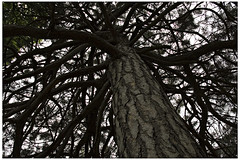Strangely, Thomas Friedman didn't write about this part of the global economy. Soon, we will be living in a Phil-Dickian dystopia.
The hidden cost of your hardwood floor | Chicago Tribune
ZHANGJIAGANG, China -- Night and day, the timber ships reach this Yangtze River port, one of the world's busiest clearinghouses for logs from every corner of the globe: Southeast Asia, the Amazon, Russia, the Congo....U.S. shoppers have become the world's best customers of low-cost Chinese flooring, furniture and plywood, buying 10 times as much as a decade ago.
But that profitable embrace comes at a steep, hidden cost: The demand for cheap Chinese goods is driving destructive logging around the world, threatening livelihoods and dividing fragile nations.
Nearly three decades into its unprecedented economic ascent, China is outstripping its own resources and roaming the planet for more. Its hunt for timber is driven by a voracious hunger for everything from wood to cashmere to oil.
That hunger has wrought damage within its borders and beyond.
and of course, like the stripping of most natural resources, the profits aren't distributed. The rich get richer, the middle class remains oblivious to the hidden costs of consumer goods, and the poor get schtupped.
points south from the flourishing coast of southern China, across 3,000 miles of the Pacific to Papua New Guinea, one of the world's most troubled and spectacular countries, which nearly abandoned logging until China came along.Digit by digit, the map leads over the mountains and glaciers to the nation's remote northwest province, Sandaun, where millions in timber profits and payments have left children without shoes and schools without plumbing.
The numeric trail ends at a specific patch of Papua New Guinea's forest. And in that forest lies a village where the torn landscape of logging has left a tribal leader unsure where to hunt for food and fearful for the future.
and all is not peachy when even the investor class starts to pay attention...
Behind that surge is a timber industry with unequaled power in local politics and business, strong enough to keep cutting trees despite mounting criticism from citizens, government and international organizations.Regulators describe a logging system in crisis. Hundreds of pages of Papua New Guinea government audits, ordered by the World Bank from 2000 to 2005, document widespread illegal and unsustainable logging, a monitoring system “fatally damaged” by budget cuts and cronyism, and “few lasting benefits” to the villagers who sell their trees.
Foreign donors and customers have begun to recoil. The World Bank canceled a conservation deal last year that would have delivered more than $30 million in loans. British timber traders recently issued a rare advisory to avoid products made of Papua New Guinea wood.
Around the world, more consumers are beginning to ask where their wood comes from, pressuring retailers to sell products certified as being from responsible sources.
British conservation groups, for instance, persuaded lawmakers to ban illegal wood from all government contracts. Illegal logging takes many forms: flat-out theft, evasion of taxes and fees, and violation of national labor and environmental laws.
Americans have been slower to realize the extent of the problem. U.S. law does not ban the sale of most illegal wood. Environmentalism has never been as popular in the U.S. as in Europe, and U.S. demand remains low for environmentally certified products.
There might be hope:
That may be changing. Just as sweatshops and “conflict diamonds” posed an ethical challenge for U.S. retailers in the past--forcing many to improve their practices--China's traffic of illegal wood tests the environmental pledges of U.S. retailers.The pressure to clamp down on illegal timber has reached Papua New Guinea, where industry executives and political allies defend logging. They call it an economic lifeline that employs more than 9,000 people, contributes up to 6 percent of tax revenue and provides more than $20 million a year in payments to landowners. Tate, the industry spokesman, said regulators' criticisms bear “no relationship to reality.”
But critics accuse timber companies of exploiting a nation unequipped to police itself in a race to feed world demand before Papua New Guinea's supply is exhausted.
“When we look at the issue in a global sense, you have to ask the question: Are the people and government of Papua New Guinea getting a good deal from forestry?” asked High Commissioner David Gordon-Macleod, the highest-ranking British diplomat in Papua New Guinea. “And the answer is: They are getting an appalling deal.”
Tags: Business, /environment

